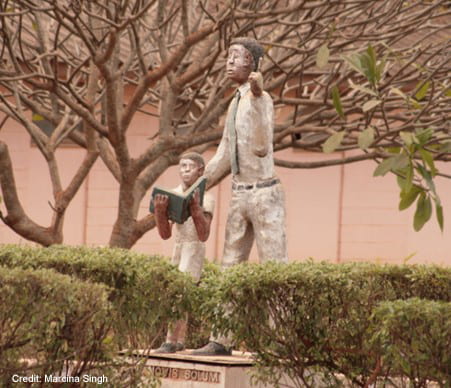By Dr Rafael Mitchell, Senior Lecturer in Comparative & International Education, University of Bristol, UK
What does professional development provision look like for teachers in African schools? What patterns exist across the region in terms of the focus and forms of provision? Who is able to access professional development opportunities, and who is being left out? What are teachers’ experiences and outcomes from provision?

In addressing the questions above, key findings are as follows:
TPD provision reflects hierarchies of power and knowledge which privilege the perspectives and agendas of those actors furthest from African classrooms. There is growing regulation around TPD in the region, often linked to processes of performance appraisal and re-licensing. Accountability systems are oriented towards monitoring teachers’ compliance with mandatory training, rather than their professional learning or changes in practice. The provision landscape is (still) dominated by one-size-fits-all training based on a ‘transmission’ view of professional learning. The limited scope for teacher agency in the design, implementation and evaluation of large-scale initiatives often leads to a mismatch between TPD provision and the needs, priorities and classroom realities of teachers. This leaves teachers feeling dissatisfied and frustrated with TPD, with an increasing tendency to avoid participation as their careers progress.
A concern for Gender Equality and Social Inclusion is reflected in the focus of TPD provision, but not in its delivery. Inclusive education and gender-responsive pedagogy are recurrent foci of compulsory in-service training in terms of content. However, the organisation of provision – whether in-person or online – tends to overlook the gendered (and other embodied) experiences of teachers themselves. As a result, we see inequitable access to TPD opportunities along the lines of gender, rurality, dis/ability, and other factors associated with disadvantage in the region.
If the findings above present a rather bleak picture of inadequate and inequitable provision, then African research evidence also offers positive lessons for policy and practice. Teachers welcome opportunities for professional development which are relevant to their needs, experience and classroom realities, particularly where this involves learning from and with senior colleagues, and values their professional knowledge and agency.
Developing TPD provision which is adequate and equitable requires turning existing norms on their head, so it is designed and developed for and with marginalised groups. This requires teachers to be active stakeholders in the development of their profession, with meaningful involvement in education debates and decision-making, particularly those from, and those serving, historically marginalised groups.
The report’s authors are Rafael Mitchell (University of Bristol, UK), Roger A. Ayinselya (University of Cape Coast, Ghana), Angeline M. Barrett (University of Bristol), Artemio A. Cortez Ochoa (University of Bristol), Opanga David (St. John’s University of Tanzania), Dan Imaniriho (University of Rwanda), Zibah A. Nwako (University of Bristol), Nigusse Weldemariam Reda (Mekelle University, Ethiopia) and Marcina Singh (University of Johannesburg, South Africa).
Further reading: A related book on teacher professionalism in Africa, Latin America and Southeast Asia is published this month through Bristol University Press, Teacher Professionalism in the Global South: A Decolonial Perspective.
